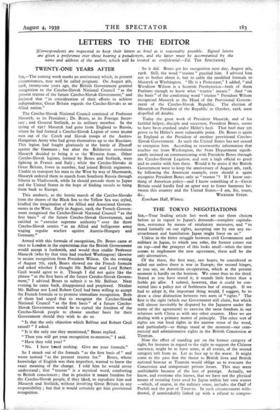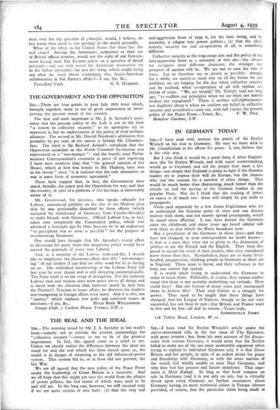THE TOKYO NEGOTIATIONS
Sm,—Your leading article last week set out three choices before us in regard to Japan's demands—complete capitula- tion, resistance by means of retaliatory measures, and "to stand formally on our rights, accepting one by one any en- croachment and humiliation japan might force on us."
Unless in the bitter struggle between civil Government and military in Japan, to which you refer, the former comes out on top—and the prospect of this looks small—when the time comes to implement the new agreement, these will be the only alternatives.
Of the three, the first may, one hopes, be considered as ruled out unless there is war in Europe; the second hinges, as you say, on American co-operation, which at the present moment is hardly on the horizon. We come thus to the third. Stated as you have stated it, it sounds little better than a feeble pis alien I submit, however, that it could be con- verted into a policy not of feebleness but of strength. If we had to adopt it, the important thing would, I suggest, be to draw a clear distinction between two sorts of " rights." The first is the right (which our Government still claim, but which will almost inevitably be disputed by the Japanese under the terms of the agreement) to exercise the same freedom in our relations with China as with any other country. Here we are dealing with a primary matter of principle. The other sort of rights are our local rights in the narrow sense of the word, and particularly—as things stand at the moment—our com- mercial and administrative rights in the British Concession at Tientsin.
Now the effect of standing pat on the former category of right, for instance in regard to the right to support the Chinese currency, might be to have some, at all events, of the second category reft from us. Let us face up to the worst. It might come to the pass that the threat to British lives and British national honour at Tientsin would oblige us to evacuate the Concession and compensate private losses. This may seem unthinkable because of the loss of prestige. Actually, we know, and everyone else knows, that we have not the physical means of resisting force used by Japan within her own waters —which, of course, in the military sense, includes the Gulf of Pechili and the port of Tientsin. In such circumstances with- drawal, if unmistakably linked up with a refusal to compro- mise over the big question of t.rinciple, would, I believe, do less harm than good to our prestige in the world generally.
What of the effect in the United States (for there lies the real crux)? Among the Americans, suspicious as they are of British official motives, would not the sight of our Govern- ment basing their Far Eastern policy on a question of broad principle—and one with wnich the Americans themselves are in the fullest sympathy—be just the thing which might bring out what we need above everything else, Ang:o-American collaboration in Far Easter affairs?—I am, Sir, &c.,









































 Previous page
Previous page